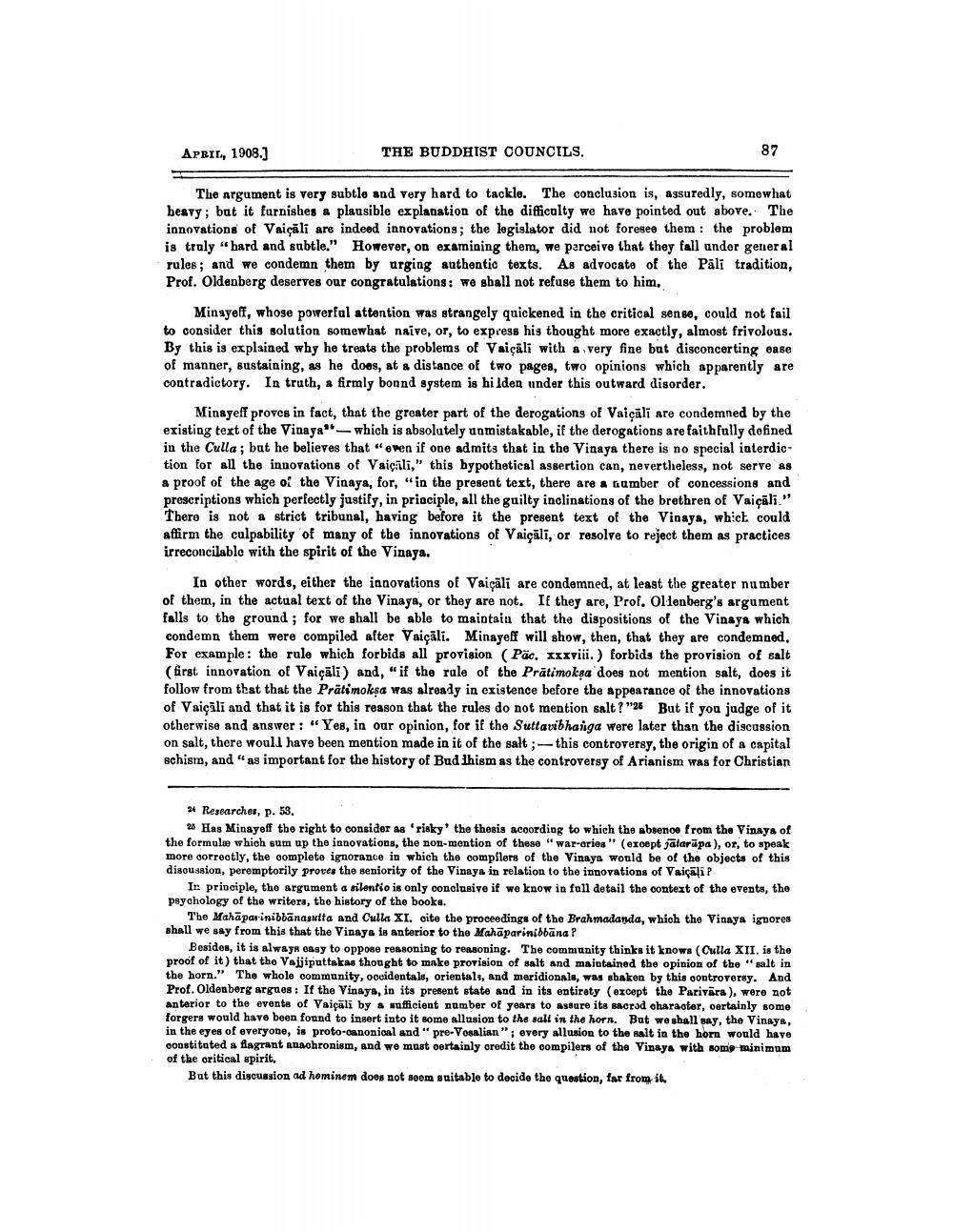________________
APRIL, 1908.)
THE BUDDHIST COUNCILS.
87
The argument is very subtle and very hard to tackle. The conclusion is, assuredly, somewhat heavy; but it furnishes a plausible explanation of the difficulty we have pointed out above. The innovations of Vaicāli are indeed innovations; the legislator did not foresee them : the problem is truly "hard and subtle." However, on examining them, we perceive that they fall under general rules; and we condemn them by arging authentic texts. As advocate of the Pāli tradition, Prof. Oldenberg deserves our congratulations: we shall not refuse them to him,
Minayeff, whose powerful attention was strangely quickened in the critical sense, could not fail to consider this solution somewhat naive, or, to express his thought more exactly, almost frivolous. By this is explained why he treats the problems of Vaicāli with a very fine bat disconcerting ease of manner, sustaining, as he does, at a distance of two pages, two opinions which apparently are contradictory. In truth, a firmly bound system is hilden under this outward disorder.
Minayeff proves in fact, that the greater part of the derogations of Vaicāli are condemned by the existing text of the Vinaya" -- which is absolutely unmistakable, if the derogations are faithfully defined in the Culla ; but he believes that even if one admits that in the Vinaya there is no special interdiction for all the innovations of Vaicāli," this hypothetical assertion can, nevertheless, not serve as a proof of the age of the Vinaya, for, "in the present text, there are a number of concessions and prescriptions which perfectly justify, in principle, all the guilty inclinations of the brethren of Vaicāli." There is not a strict tribunal, having before it the present text of the Vinaya, which could affirm the culpability of many of the innovations of Vaicālī, or resolve to reject them as practices irreconcilable with the spirit of the Vinaya.
In other words, either the innovations of Vaicāli are condemned, at least the greater number of them, in the actual text of the Vinaya, or they are not. If they are, Prof. Ollenberg's argument falls to the ground; for we shall be able to maintain that the dispositions of the Vinaya which condemn them were compiled after Vaicāli. Minayeff will show, then, that they are condemned. For example: the rule which forbids all provision (Päc. xxxviii.) forbids the provision of salt (Girgt innovation of Vaicāli) and, "if the rule of the Prātimoksa does not mention salt, does it follow from that that the Prātimokşa was already in existence before the appearance of the innovations of Vaicāli and that it is for this reason that the rules do not mention salt?"26 But if you judge of it otherwise and answer: "Yes, in our opinion, for if the Suttavibhanga were later than the discussion on salt, there woull have been mention made in it of the salt ;--this controversy, the origin of a capital schism, and "as important for the history of Bud lhism as the controversy of Arianism was for Christian
24 Researches, p. 59.
28 Has Minayoff the right to consider as 'risky' the thesis acoording to which the absence from the Vinaya of the formule which sum up the innovations, the non-mention of these "war-ories" (except jätarūpa), or, to speak more correctly, the completo ignorance in which the compilers of the Vinaya would be of the objects on discussion, peremptorily proves the seniority of the Vinaya in relation to the innovations of Vaicāļi ?
Ir principle, the argument a silentio is only conclusive if we know in full detail the context of the events, tho psychology of the writers, the history of the books.
The Mahāparinibbānasutta and Culla XI. oite the proceedings of the Brahmadanda, which the Vinaya ignores shall we say from this that the Vinaya is anterior to the Mahāparinibbana ?
Besides, it is always easy to oppose reasoning to reasoning. The community thinks it knows (Culla XII. is the proof of it) that the Vajjiputtakaa thought to make provision of salt and maintained the opinion of the "salt in the horn." The whole community, oovidentale, orientals, and meridionala, was shaken by this controversy. And Prof. Oldenberg argues: If the Vinays, in its present state and in its entirety (except the Parivara ), were not anterior to the events of Vaicāli by a sufficient number of years to assure its sacrad character, certainly somo forgers would have been found to insert into it some allusion to the sall in the horn. But we shall say, the Vinaya,
f everyone, is proto-canonical and "pre-Vosalian"; every allusion to the salt in the horn would have constituted a flagrant anachronism, and we must oertainly credit the compilors of the Vinaya with some minimum of the oritical spirit.
But this discussion ad hominem does not soom suitable to decide the question, far from it.




